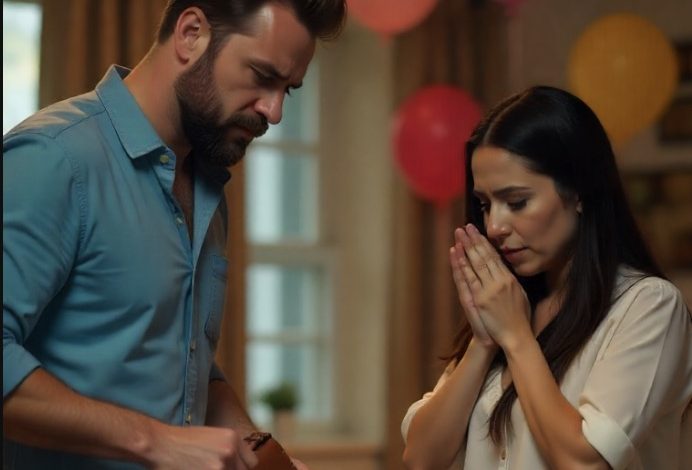He Laughed as He Threw My Birthday Gift in the Trash. Seven Days Later, I Made One Phone Call That Changed Everything

My name is Nancy King. I’m thirty-six, a single mother, and for three months I gave almost every spare minute to make my father’s sixtieth birthday something he would remember. The heart of my work was a photo album — not a store-bought thing, but a handbound book with thick pages, leather cover, and pictures arranged so each page told a piece of our family’s story. I dug through attic boxes, called older cousins, scanned yellowed photos, and wrote little notes beside each picture. I wanted him to see our life — the small, ordinary, perfect bits — all in one place.
Our house in suburban Cleveland smelled like coffee and warm candles on the day of the party. Friends and family filled the living room. Laughter rose and fell; plates clinked; someone told the same old joke and everyone laughed anyway. I held the album close, feeling the weight of those months of work in its cover. My palms were damp; I couldn’t wait to see Dad’s face when he opened it.
I waited for the right moment: after the cake, after the toasts, when he would be relaxed and the room would be quiet enough to hear pages turn. I set the album down carefully on the gift table and moved back into the crowd, a small smile tugging at my lips.
Then came the sound — a ripping, ugly and sharp, like fabric torn too fast. The room stopped. For half a beat everything was still but for my own breath. I turned toward the sound and saw my brother, Steven, leaning by a trash can, drink in hand. At his feet, on the floor, lay my album, pages strewn and bent, photographs torn, the leather cover slashed. My handwriting bled into the paper where the pages had been ripped out and crumpled.
“Oops. Just an accident,” Steven said, his voice slick with false innocence. He smiled that hard, small smile he uses when he wants people to think he’s joking. Around him a few of his friends snickered. My heart dropped through my shoes.
Before I could say anything, my mother, Frances, pushed through the people. Instead of coming to my side she stood in front of Steven and shook her head as if I were the one out of line. “Nancy, don’t make a scene,” she said, like it was my fault the album had been torn. “He didn’t mean it. It was just a silly mistake.”
A silly mistake. Three months of collecting, writing, binding — erased with a flick of a wrist and a shrug. My mouth tasted like metal. My hands were shaking. I wanted to pick up the pieces, pull the photos together, glue them back, tell the story back into the paper. But the crowd’s awkward silence and Dad’s puzzled face kept me from making a scene I feared would ruin his day.
No one stepped forward. An aunt who’d once babysat me checked her phone instead of helping. An uncle cleared his throat and changed the subject. My cousin murmured something about “kids these days” and moved away. I stood frozen, small and stupid, with my palms full of nothing but betrayal.
I grabbed my bag and left without a word. The night air hit my cheeks but did nothing to cool the heat under my skin. I walked to the car in a fog, feeling humiliation and fury grow together like rough vines. I sat for a long time in the driver’s seat, hands on the wheel, my breath loud in the quiet of the parked cars. I thought of all the things Steven had taken from me over the years — little jabs, the louder jokes, the way my voice was smoothed over at every family table. But this was different. This was violent and public.
I promised myself then that I would not let it end with that ruined book.
Growing up, the family always made room for Steven’s stories. He got the loud praise at graduations, his name said often and with fanfare. He was the kind of son parents brag about — successful, sure of himself, always with a new bright thing to show. I worked hard, raised my son alone, paid bills, tried to be steady in a way that doesn’t show up on a resume. I’d learned to be the quieter kind of strong. I’d accepted being the background sometimes. But I had never accepted being treated like nothing.
That night, with the album destroyed, I couldn’t sleep. My friend Carol stopped by with a bottle of cheap wine and listened as I told the story twice over, once for the pain and once to make the facts real. “He didn’t just make a joke,” I said, rubbing my temple. “He made a point. He wanted me to be humiliated.”
Carol held my hand and said what she always does: “You don’t deserve that, Nancy. You poured your heart into that book. He can’t take that away from you.” Her words were a bandage I didn’t know I needed.
Two days later I discovered the last straw. Months earlier, when Steven and Diane — his fiancée — were planning a large wedding, I’d made a gesture I thought would be kind. I had put down a deposit for the venue — a nice Italian place downtown — two thousand dollars as my gift to them. I had meant it as an olive branch, a way to smooth things. After the album, after the mockery and the text he sent that night — “Nice try with that scrapbook, sis. Too bad it ended up where it belongs ; )” — I realized I had been foolish.
I called the restaurant manager. My voice was quiet but steady. “Hi, this is Nancy King. I’m calling about the deposit for Steven King’s wedding. I’d like to cancel it and have the money returned to my card.”
There was a pause on the other end. I could hear the manager rustle paperwork. “Ma’am, we can’t just cancel a contracted deposit without cause.” He sounded professional, but he also sounded like someone who understood what a deposit was — both practical and symbolic.
“It’s my deposit,” I said. “Please cancel it. Process the refund.”
“If you submit a written request and the contract allows, we can proceed,” he said. “It will take a few days.”
I hung up and felt lighter than I had in weeks. The weight of generosity I had placed on his head was gone. It felt like reclaiming a small piece of my dignity.
I knew what would happen next. Steven wouldn’t blame himself. He’d find a way to play the victim. He’d spin the story to fit a narrative where I became the villain who ruined his joy. He was good at that. He had always been good at turning things to his favor. He had friends who would back his version, and a social life that seemed to multiply every slight into a parade of sympathy.
And he did exactly that. He posted about it — long, dramatic, self-justifying posts on social media. “Family drama,” he wrote, portraying himself as the wounded son abandoned by a bitter sister. Comments rolled in from acquaintances and distant aunts: people who didn’t know the whole story, people who saw his polished life and took his side without asking questions. “Nancy is always the difficult one,” someone wrote under his post. “Let him be happy.”
My mother called that same afternoon. Her voice was tight with anger and confusion. “Nancy, why would you cancel the deposit? You know how important this is to Steven. You’re making a scene.”
“Mom,” I said, gripping the phone until my knuckles whitened, “he ruined something I made for your husband’s birthday. He shredded it in front of everyone. He mocked me about it. I can’t keep giving him support after that.”
“You should have handled it like an adult,” she said. “Why go online? Why cancel? You’re just adding fuel to the fire.” Her words sounded more like blame than worry. I felt that old, familiar ache — favored child on one side, the forgotten one on the other. I tried to explain the look in his eyes when he tore the pages, the way he had enjoyed it. She listened but didn’t hear me. She left with a cold “I’m disappointed” and closed the door softly.
The backlash from Steven’s posts started to press on my life. Friends called with questions. Cousins who hadn’t spoken to me in years weighed in to say I should apologize, that families need to behave for ceremonies, that weddings are sacred and should not be used as battlefields. Even people who had always been kind seemed unsure. Silence made my chest ache.
That same week, Diane called me. I expected another lecture or a cold shoulder. Instead, she surprised me. Her voice was small and shaky. “Nancy… I’m so sorry,” she said. “I was there that day. I saw what Steven did. I saw you leave. I should have said something. I didn’t. I’m sorry I didn’t stand with you.”
Her apology moved through me like cool water. “Thank you,” I said. “I appreciate you saying that.”
She told me how Steven had been talking to his friends about humiliating my gift, how he had been proud of it. She said she hadn’t understood him until she saw that night. There was shame in her voice, real shame, and it changed something in the story. If she had seen it herself and could say she’d been wrong, others might begin to look more closely too.
Still, the internet had done its work. People had chosen sides and posted their takes. The wedding planning went into chaos. Contracts sit on paper for a reason, and deposits are not just money; they are a promise. My cancellation led to the restaurant notifying them that without a deposit the date might not hold, and without the deposit they had no guarantee. For a couple who’d counted on that deposit to hold their date, the news landed like a cold cliff.
A week after I sent that cancellation request, my father called. He sounded different on the phone — a small, thin voice that held shock and confusion. “Nancy,” he said, “why did the venue cancel Steven’s wedding?”
I could hear his worry like a physical thing. He pictured his son heartbroken, planning ruined, an entire celebration in danger. He asked in a way that showed he didn’t suspect me; he only knew his boy was hurt. For a second I thought about telling him everything right then — about the shredded album, the laughter, my mother’s words — but it would have been cruel to dump that on his birthday hangover. The hurt I’d promised to shield him from still mattered.
So I smiled into the phone, even though he couldn’t see it. “Dad,” I said, keeping my voice soft and steady, “I took care of it.” The pause on the other end was long. Then he said, “You did what?”
“I cancelled the deposit,” I said. “I couldn’t keep giving and being dismissed. I’m sorry if it caused trouble. I did it because I couldn’t sit back and watch him destroy the things I make with my hands.” My voice didn’t shake. I felt strange and calm.
There was silence, and then Dad’s voice broke. “Nancy … I don’t know what to say.” The bewilderment was in his words, but also something else — maybe a dawning realization. I could hear his mind working through memories: the photo album piled on the table, his daughter’s face when she left the party, his son standing with the snapped pages under his feet.
A week later, the venue confirmed the cancellation publicly: they had booked the date for another event. The wedding could not proceed on that day unless a new deposit was made. The news trickled out among guests. Steven raged, blamed me, posted furious messages, made phone calls, tried to repair the mess by promising to pay double, to beg favors, to throw money at it. Some doors opened again. Some did not.
In the weeks that followed, families split into quiet camps. Certain relatives kept their distance, not wanting to pick a side. Others quietly came to me to ask what they had missed, and when I told the truth, they looked ashamed. Diane and I talked more. She started calling her own parents; she began to see how fragile the house of favor and neglect had been built.
What had begun as a small act of arrogance — my brother shredding a book — had become a test. It asked each of us what we valued: pomp and a perfect show, or honesty and care for the people who make those moments real. I didn’t want to smash his wedding on purpose. I wanted him to see the cost of what he had done. I wanted him to feel the recoil of throwing away someone else’s love.
Not long after, at another family event, I sat with Dad and we looked through the pictures I still had on my phone. We laughed at the old hairstyles, we turned pages and told stories about the places and people who had been in those photos. He held my hand and said, “Nancy, I’m sorry.” It wasn’t a speech for everyone, just a quiet truth between us. He didn’t make excuses; he simply put his palm on mine.
I had lost an album to someone’s cruelty, but I had kept something else. I had kept my voice. I had stopped letting the habit of being put down by louder words rule me. The album could be remade. Photos could be reprinted. The time we spent together now was real and given freely, not staged for applause. Whatever else happened with Steven and his wedding, I knew I had acted in a way that matched the value I wanted to hold.
And when Dad asked me again, some weeks later, if I regretted what I’d done, I looked at him and shook my head. “No,” I said. “I don’t regret it.” He squeezed my fingers and smiled a tired, thankful smile. In the end, the torn pages did more than destroy a book; they opened a door to truth. That, I thought, was worth everything.









